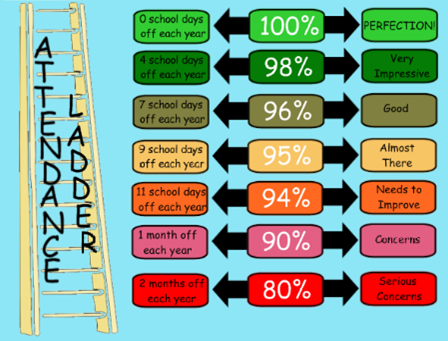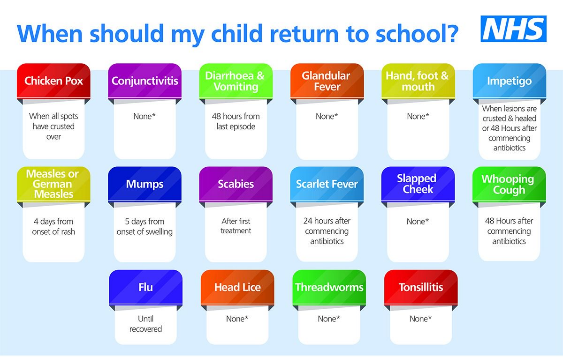Why is attendance important?
Every child in the United Kingdom has the right to a full-time education, so that they can develop to their fullest potential and gain important skills that prepare them for the future, increasing their life choices.
There are lots of benefits to attending school regularly, including:
- Improved education attainment and progression
- Positive development of friendships
- Positive development of social skills
- Positive development of teamwork
- Positive development of life skills
- Positive development of cultural awareness
- Identification of career pathways
What is considered good attendance?
We always aim for 100% school attendance to help maximise children’s access to education and learning and to support them to achieve their full potential. We acknowledge that for a small number of children this attendance figure will not be possible due to reasons of ill health, disability, or other social/emotional needs. In these cases, children’s attendance will be viewed within the context of each individual learner’s needs so that they can be supported to achieve their highest level of attendance.
How is attendance calculated?
Attendance is measured by the number of sessions a child is in school. There are two sessions a day and a register is taken once in the morning and once in the afternoon. There are 10 sessions in a school week, children must attend all 10 sessions each week to achieve 100% attendance.
Schools use a system that calculates how many times a child was expected to be in school and how many they were in school for. This gives the school an attendance percentage for each child.
What are my duties as a parent/carer?
The law entitles every child of compulsory school age to a suitable full-time education. Parents/carers have a duty, under section 7 of the Education Act 1996, to ensure that their child of compulsory school age (5 to 16) receives an efficient full-time education either by attendance at school or otherwise, and so share in the responsibility of ensuring good and regular attendance. It is the legal responsibility of all parents/carers to ensure their child receives that education by full-time attendance at school or otherwise.
This means that parents must ensure that:
- Their child receives an education either by attendance at a school, or by education otherwise than at a school for example elective home education.
- Their child attends that school regularly. This means their child must attend every day that the school is open, except in a small number of allowable circumstances such as being too ill to attend or being given permission for an absence in advance from the school.
Parents are expected to:
- Ensure their child attends every day that the school is open
- Notify the school as soon as possible when their child will be unexpectedly absent
- Work with the school and local authority to help them understand their child’s barriers to attendance.
- Proactively engage with the support offered to prevent the need for more formal support.
- Proactively engage with the formal support offered – including any attendance contract or voluntary early help plan to prevent the need for legal intervention.
Good attendance is linked with improved achievement at school, the more a child is in school the more progress they will make.
The DfE have worked with the Attendance Action Alliance to provide guidance for parents on school attendance Resources for families | Children’s Commissioner for England (childrenscommissioner.gov.uk)
As absence is often a symptom of wider issues a family is facing, schools, trusts and local authorities work together with other local partners to understand the barriers to attendance and provide support. Where that is not successful, or is not engaged with, the law protects pupils’ right to an education and provides a range of legal interventions to formalise attendance improvement efforts, and where all other avenues have been exhausted, enforce it through prosecuting parents. Attendance legal intervention can only be used for pupils of compulsory school age and decisions are made on an individual case by case basis.
Attendance Interventions
Attendance Interventions are broken down into three categories: voluntary, formal and statutory involvement. Our team work with schools to support appropriate consideration of support levels required. Where voluntary support is not having an impact on attendance improvement, schools can consider a more formal support.
Helping parents to access services of their own accord and/or a voluntary whole family plan to tackle the barriers to attendance
A formal attendance contract agreed by the pupil, parent, school and/or local authority Progressing to a legally binding Education Supervision Order in the Family Court if there is nonengagement and deemed necessary
This can be consideration of statutory social care where there are safeguarding concerns or Attendance prosecution.
Where all other routes have failed or are not deemed appropriate, the case should be considered for attendance prosecution in the Magistrates Court (or a FPN for irregular attendance
What is persistent absence?
Good attendance is important and even though 90% sounds really good it means that a child is missing 10% of their education.
Children who attend school 90% or less are considered to be persistently absent. This is a total of 19 school days over the academic year. This will have a negative impact on their education and ability to catch up on the work missed.
What is the impact of missing school?
Attendance is linked with achievement. Research shows that missing 17 school days negatively impacted on a child’s GCSE results. For some children this could be the difference between passing or not passing and then having to retake their GCSE in college or getting the grade required to get into the further education course of their choice or not.

How can I support and improve my child’s attendance?
To support your child’s regular attendance at school, you can do the following things to help:
- Make medical and dental appointments outside of school hours, such as during the holidays
- Do not take holidays in term time. Children who miss school because of holidays miss essential lessons. You must get holiday requests authorised before you book a holiday, otherwise you risk your child being marked as having unauthorised absence.
- Only allow time off when your child is too unwell to be at school (see NHS guide below for more information).
- Praise and encourage good attendance with your child and promote the benefits of being at school.
- Implement positive bedtime and morning routines, make sure your child is organised for school the night before by ensuring they have their bag packed, Pee kit ready, homework completed and alarm set
- Make sure your alarm clock is set in good time
What can I do if I am worried about my child’s attendance?
- Phone the school as soon as you think your child may be absent and advise the reason why.
- Always talk to the school if you are worried about your child’s attendance. Share with them any reasons why attendance is difficult and what you might find helpful. It is always better to share concerns early to prevent them continuing.
When to keep your child off school for illness

Further information on when it is advised to keep your child off school for common illnesses can be found on the NHS website.
If your child has not yet reached compulsory school age , attendance in the early years is still important. Not only will this support your child’s development but setting good routines now will help you in the future. For further information take a look at our leaflet Every Day Counts – Good attendance in the early years.
FAQs
We work with schools to help them improve the attendance of their pupils. Sometimes schools need specialist help. We offer bespoke attendance support which may involve working with families. This often means closely working with other agencies. Our aim is to make a difference to the outcomes for children and young people by improving and sustaining regular school attendance.
If you have been invited to an attendance meeting, then you will be contacted by one of our team to let you know why the meeting has been arranged and when and where it will take place. During the meeting we will discuss the reasons behind why the meeting has been called and aim to identify barriers stopping your child from attending school regularly. Together with the school we will develop an action plan to help reduce the barriers and improve your child’s attendance at school. The action plan will be reviewed to see if it is working and what may need to happen next.
Improving school attendance
Tips for parents on good attendance
It is important to establish regular school attendance habits from the start. This will influence attendance in the future. Good school attendance and punctuality will help children in their future.
- Preparation – help your child to get everything ready the night before.
- Establish a good bedtime routine – when a child gets enough sleep it can make mornings less of a struggle.
- Allow time to travel to school – rushing can be very unsettling for your child and is not a good start to their day.
- Help children to understand why attending school is important, why it will help them now and in the future for whatever they want to do when they are older.
- Take an interest in their education and how their day has been. Give them an opportunity to talk to you about any worries or concerns they may have early on, so they don’t hold on to them and cause a bigger problem.
If you have concerns about your child’s attendance, remember you are not alone. By working together to find solutions, little problems won’t develop into big ones. Talk to your child’s teacher to resolve any issues early. The school will always be there to help support you and your child.
How to set good routines
Putting in place a routine for getting ready for school, that works for you can help reduce stressful situations in the morning and help you get a calmer start to the day. Family Lives has information for parents about a school routine. Click here for some additional tips to help you create a morning routine and here for a document to help you set up your own routine.
Some children and parents can find separating difficult, especially after a school break or a long period of time at home following an illness. More parents and children experienced this difficulty following the local and national lockdowns during the recent pandemic. To support the return to school, the Mentally Healthy Schools website that belongs to the Anna Freud Centre put together tips and guidance for parents.
